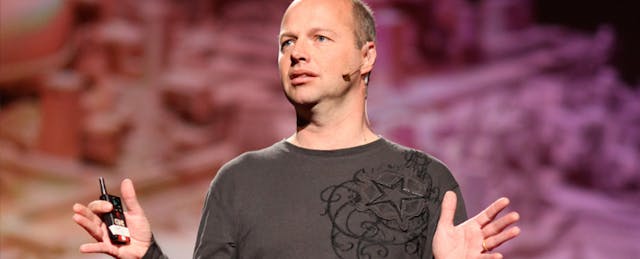TWEET THAT CLASS: We slipped into a talk at the Palo Alto Commonwealth Club by Sebastian Thrun, founder and CEO of Udacity. Along with telling his story of how Udacity got started---and even named--Thrun shared a few comments on his company's pilot program with the California State University system and education broadly. Among them:
On helping students who currently are not served by colleges: "In California, we have 470,000 students waitlisted to get into community colleges. They're willing and eager to pay for education. But they can't get in." Udacity aims to help support students who are not yet in college, who have to make up work to quality for college and who want to continue learning once they leave college.
On Udacity's program with San Jose State University: Although the program with San Jose State is a pilot for only 300 students, it's "all set up to scale." Udacity is offering classes such as remedial math and statistics; students get credits that they can take into the UC university system. The programs cost the university 10% of the cost of a traditional program. Udacity is currently not making a profit on the program, Thrun conceded.
On learning: "The biggest revolution in learning is Google and Wikipedia. We learn on demand, when we need it." If you recently learned how to refinance your house or read up on vacation spots, you learned on demand, noted Thrun. "You can have the information at your fingertips. It's so profoundly different from education. We have to take education out of the extremely curated environment -- and bring it back to the playful model -- and let students learn at their own pace."
On partnerships: Udacity has formed partnerships with 350 companies that are interested in seeing the resumes of Udacity students. "It turns out, if you take 15 Udacity classes, that's not a great predictor of success. A good balance is more advisable."
On hiring: Udacity has hired about 15 people itself from its student population; the jobs didn't go to those who scored highest on the tests but to those who proved most helpful in the online discussion groups.
On cheating: Udacity is offering proctored tests, both in live environments and in online environments. Thrun says he believes people are a bit too obsessed over cheating. "The vast majority [of Udacity students] don't cheat. If you find a way to cheat around 1,000 quizzes, you probably deserve to pass. And if you find people to participate in your place in online forums, you should probably be a manager. As we transform testing from summative to formative assessment, then assessment becomes your friend. You crave to get to the next level. You cheat--and you lose."
On retention: "The Achilles heel [of MOOCs] is that the retention rates are low. Typically a class of 20,000 might have 500 or 1,000 finishers … We felt that any solution that only carries 3% of kids isn't a great solution." Udacity has consequently added mentors to help shepherd students through the program and added the incentive of college credit. Those efforts have boosted retention from 3% to 100%, Thrun asserts.
On the name: On the night they were filing papers to create the company, "'Audacity' was taken. We liked the 'U' for university, for you. So we became 'Udacity.'" He conceded that other countries can find the name challenging. "We become 'U-da-city' in Europe."
On badges: "We've found more resistance among students than employers. We have yet to find an employer who won't take them at face value; they don't care much about whether the exams were proctored….The biggest obstacle is on thIe student side." Invest in a poor education and you practically need another life to catch up, Thrun suggested. "I see a lot of signals that [for students] it's really important to stay within the for-credit, existing system.
On whether he's taken a MOOC class: "I've never made it through a complete MOOC," Thrun confessed. Much as books have been shrunk down to the size of 140 character tweets, Thrun says he expects that we'll continue to compress education.
"I believe that 50 years from now, education will be as short and sweet as Twitter is today. It will be like an evening talk. And that will be a fantastic moment."
The entire hour-long talk will air on KQED radio (88.5FM in San Francisco) on Friday, April 5 at 8 p.m. PT.


